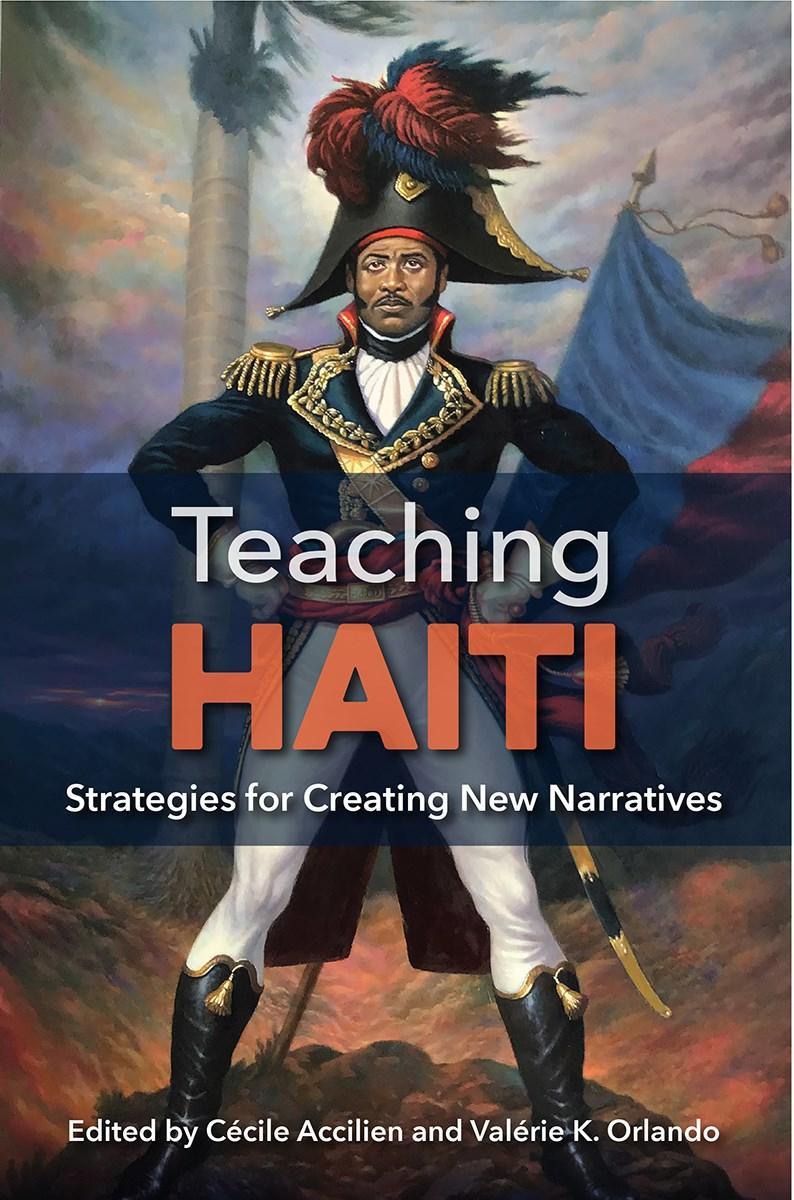
11 minute read
LITERARY CRITICISM
University of Florida Press 9781683402107 Pub Date: 8/10/2021 $95.00 Discount Code: Short Hardcover Paper over boards 270 Pages History / Caribbean & West Indies HIS041000 9 in H | 6 in W | 0.8 in T | 1.1 lb Wt
Teaching Haiti
Advertisement
Strategies for Creating New Narratives
Cécile Accilien, Valérie K. Orlando
Markup Note: : Rights Available: Translation, Audio, Film and Television
Contact
Milo Brooks Rights@upress.ufl.edu
Summary
This volume provides guidance on teaching about Haiti’s history and culture from a multidisciplinary perspective, offering ways of reshaping old narratives through women’s and gender studies, poetry, theater, art, religion, language, politics, history, and popular culture. This volume is the first to focus on teaching about Haiti’s complex history and culture from a multidisciplinary perspective. Making broad connections between Haiti and the rest of the Caribbean, contributors provide pedagogical guidance on how to approach the country from different lenses in course curricula. They offer practical suggestions, theories on a wide variety of texts, examples of syllabi, and classroom experiences. Teaching Haiti dispels stereotypes associating Haiti with disaster, poverty, and negative ideas of Vodou, going beyond the simplistic neocolonial, imperialist, and racist descriptions often found in literary and historical accounts. Instructors in diverse subject areas discuss ways of reshaping old narratives through women’s and gender studies, poetry, theater, art, religion, language, politics, history, and popular culture, and they advocate for including Haiti in American and Latin American studies courses.
Contributor Bio
Cécile Accilien, professor and chair of the Interdisciplinary Studies Department at Kennesaw State University, is the author of Rethinking Marriage in Francophone African and Caribbean Literatures.
Valérie K. Orlando, professor of French and Francophone literatures at the University of Maryland, College Park, is the author of The Algerian New Novel: The Poetics of a Modern Nation, 1950-1979 and New African Cinema.
NOW IN PAPERBACK
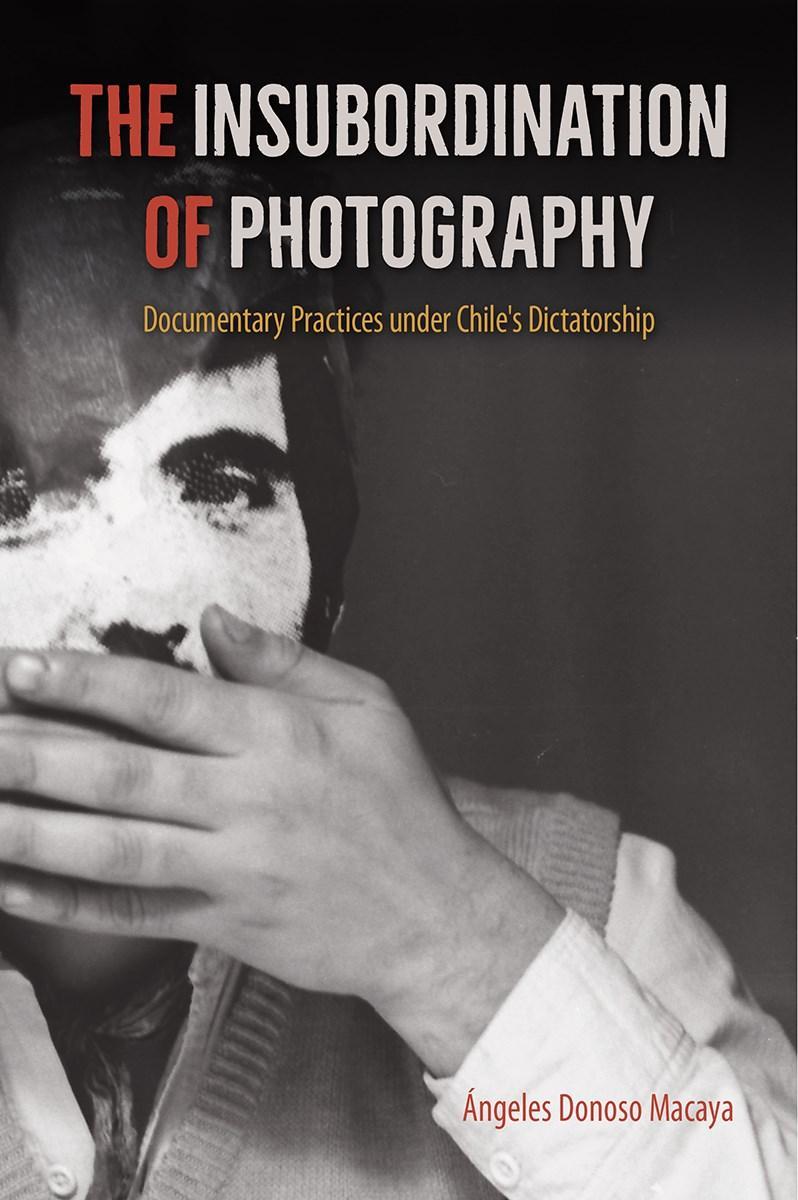
University of Florida Press 9781683403548 Pub Date: 1/24/2023 $28.00 Discount Code: trade Trade Paperback 298 Pages History / Latin America HIS033000 Series: Reframing Media, Technology, and Culture in Latin/o America 9 in H | 6 in W | 0.8 in T | 1.2 lb Wt
The Insubordination of Photography
Documentary Practices under Chile's Dictatorship
Ángeles Donoso Macaya
Markup Note: : Rights Available: Translation, Audio, Film and Television Rights Unavailable: Spanish Translation
Contact
Milo Brooks rights@upress.ufl.edu
Summary
The role of documentary photography in exposing and protesting the crimes of a dictatorship
Latin American Studies Association Visual Culture Section Best Book Prize
Latin American Studies Association Historia Reciente y Memoria Section Best Book Prize
After Augusto Pinochet rose to power in Chile in 1973, his government abducted, abused, and executed thousands of his political opponents. The Insubordination of Photography is the first book to analyze how various collectives, organizations, and independent media used photography to expose and protest the crimes of Pinochet's authoritarian regime. Ángeles Donoso Macaya discusses the ways human rights groups such as the Vicariate of Solidarity used portraits of missing persons in order to make forced disappearances visible. She also calls attention to forensic photographs that served as incriminating evidence of government killings in the landmark Lonquén case.
Contributor Bio
Ángeles Donoso Macaya is professor of Spanish at the Borough of Manhattan Community College/CUNY and professor of Latin American culture and visual studies at The Graduate Center/CUNY. She is coeditor of Latinas/os on the East Coast: A Critical Reader.
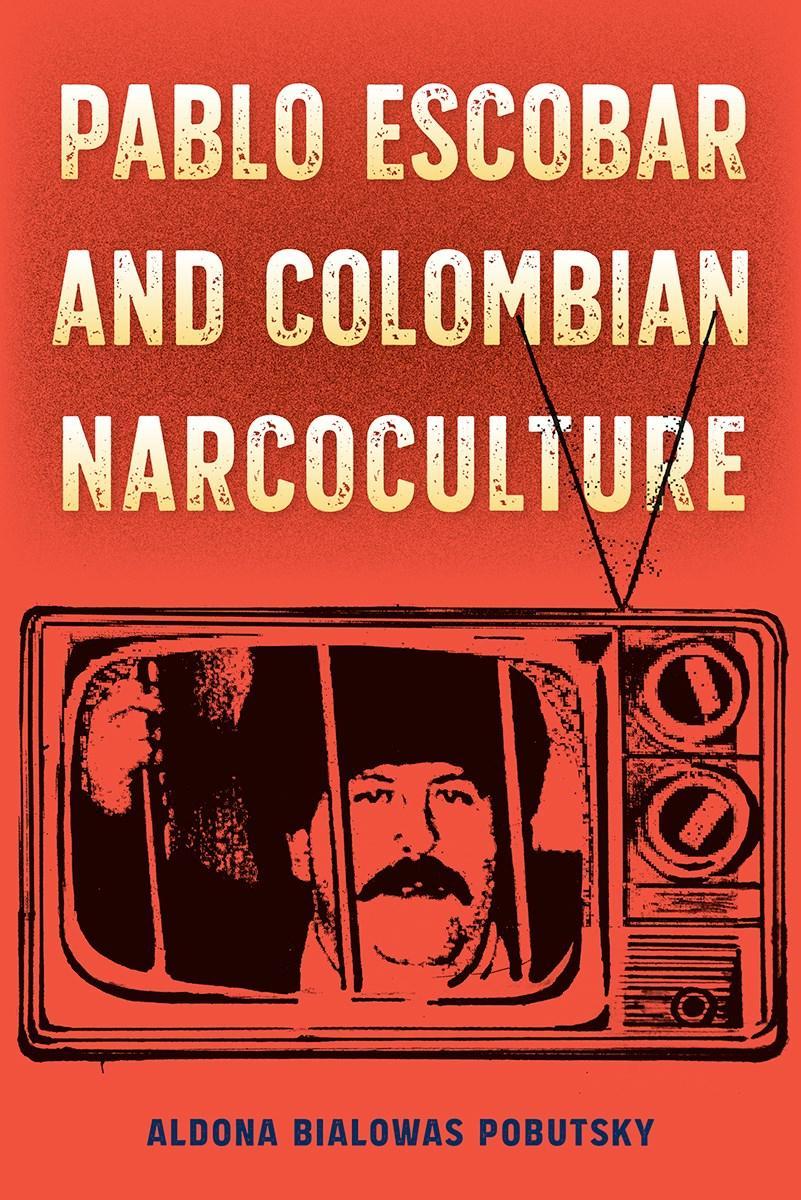
University of Florida Press 9781683401513 Pub Date: 4/21/2020 $85.00 Discount Code: short Hardcover Paper over boards 306 Pages Series: Reframing Media, Technology, and Culture in Latin/o America 9 in H | 6 in W | 1 in T | 1.3 lb Wt
Pablo Escobar and Colombian Narcoculture
Aldona Bialowas Pobutsky
Rights Available: Translation, Audio, Film and Television
Contact
Milo Brooks Rights@upress.ufl.edu
Summary
In this exploration of Colombian drug lord Pablo Escobar’s impact on popular culture, Aldona Bialowas Pobutsky shows how Escobar’s legacy inspired the development of narcocultura—television, music, literature, and fashion representing the drug-trafficking lifestyle—in Colombia and around the world. In the years since his death in 1993, Colombian drug lord Pablo Escobar has become a globally recognized symbol of crime, wealth, power, and masculinity. In this long-overdue exploration of Escobar’s impact on popular culture, Aldona Bialowas Pobutsky shows how his legacy inspired the development of narcoculture—television, music, literature, and fashion representing the drug-trafficking lifestyle—in Colombia and around the world. Pobutsky looks at the ways the “Escobar brand” surfaces in bars, restaurants, and clothing lines; in Colombia’s tourist industry; and in telenovelas, documentaries, and narco memoirs about his life, which in turn have generated popular interest in other drug traffickers such as Griselda Blanco and Miami’s “cocaine cowboys.” Pobutsky illustrates how the Colombian state strives to erase his memory while Escobar’s notoriety only continues to increase in popular culture through the transnational media.
Contributor Bio
Aldona Bialowas Pobutsky is associate professor of modern languages and literatures at Oakland University.
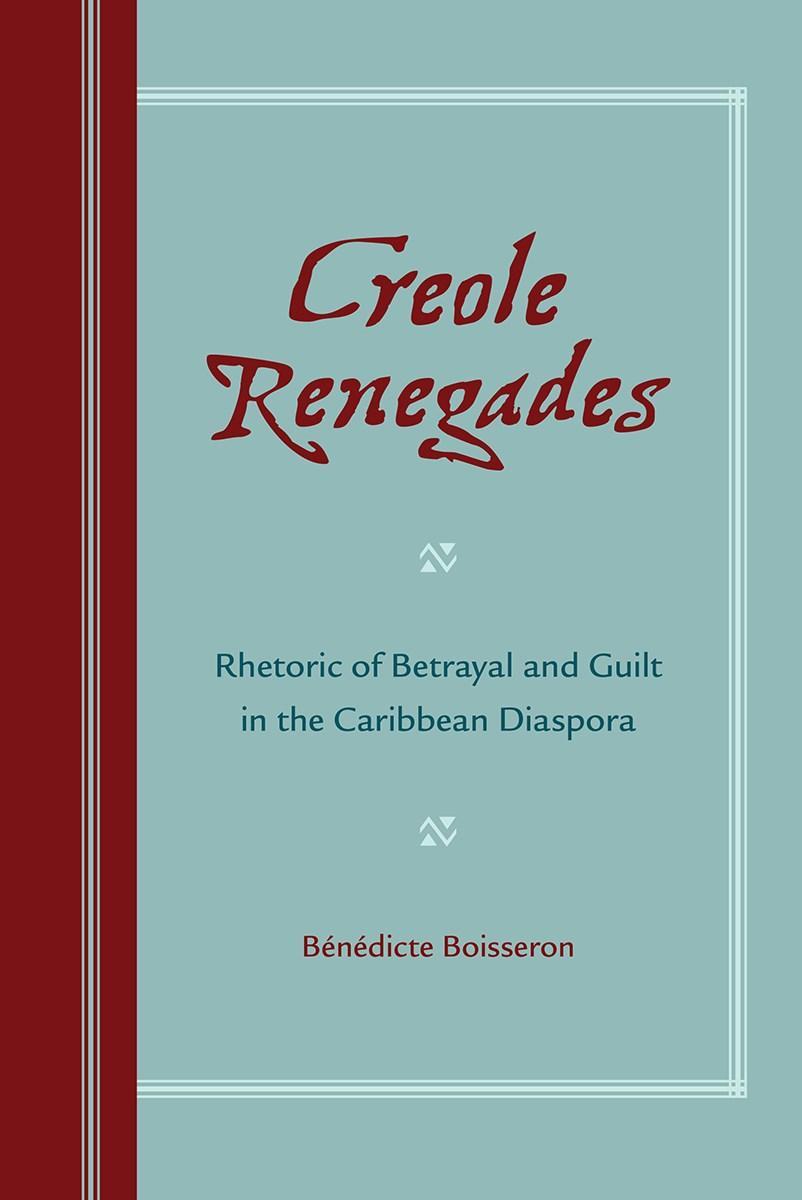
University Press of Florida 9780813068794 Pub Date: 5/31/2022 $26.95 Discount Code: Trade Trade Paperback 240 Pages 9.3 in H | 6.1 in W | 0.6 in T | 0.8 lb Wt
Creole Renegades
Rhetoric of Betrayal and Guilt in the Caribbean Diaspora
Bénédicte Boisseron
Markup Note: : Rights Available: Translation, Audio, Film and Television
Contact
Milo Brooks Rights@upress.ufl.edu
Summary
Caribbean Philosophical Association Nicolás Cristóbal GuillénBatista Outstanding Book Award
Caribbean Studies Association Barbara T.Christian Literary Award, Honorable Mention
In Creole Renegades, Bénédicte Boisseron looks at exiled Caribbean authors—Edwidge Danticat, Jamaica Kincaid, V. S. Naipaul, Maryse Condé, Dany Laferriére, and more—whose works have been well received in their adopted North American countries but who are often viewed by their home islands as sell-outs, opportunists, or traitors.
These expatriate and second-generation authors refuse to be simple bearers of Caribbean culture, often dramatically distancing themselves from the postcolonial archipelago. Their writing is frequently infused with an enticing sense of cultural, sexual, or racial emancipation, but their deviance is not defiant. Underscoring the typically ignored contentious relationship between modern diaspora authors and the Caribbean, Boisseron ultimately argues that displacement and creative autonomy are often manifest in guilt and betrayal.
Contributor Bio
Bénédicte Boisseron is Professor of Afroamerican and African Studies at the University of Michigan, Ann Arbor. She is the coeditor of Voix du monde: Nouvelles francophones.
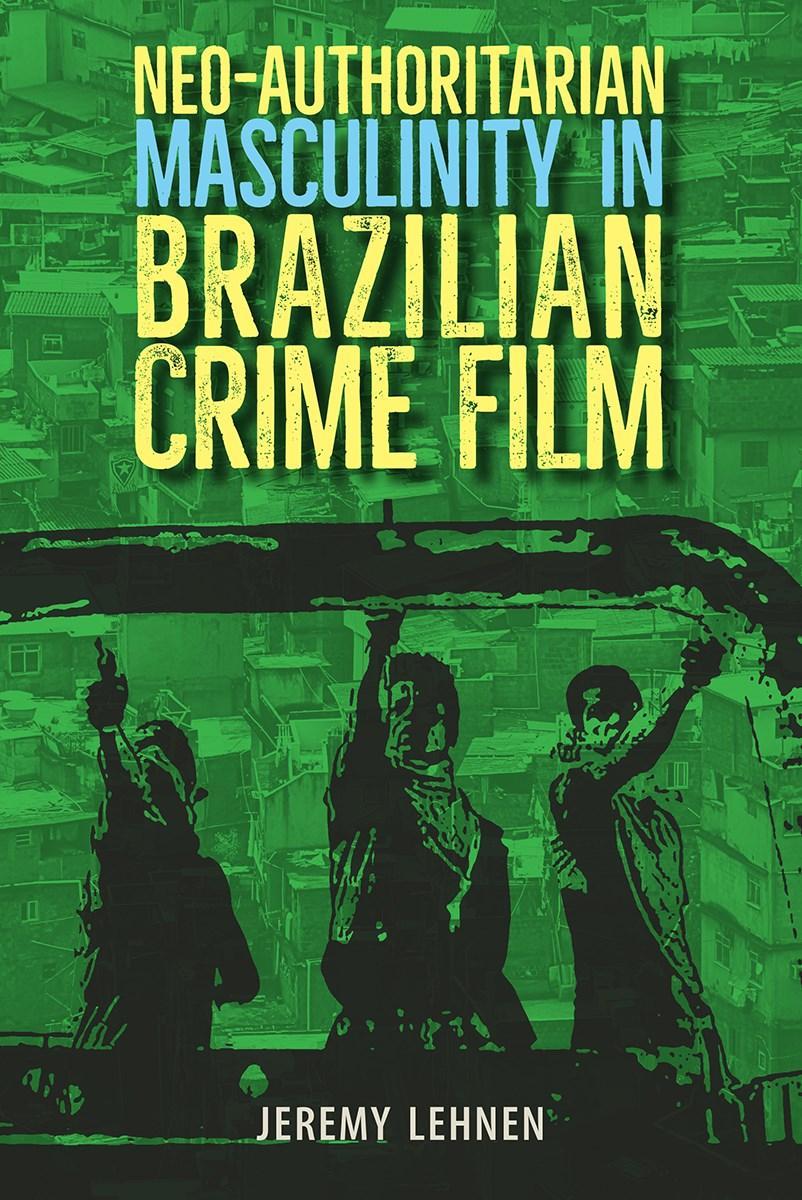
University of Florida Press 9781683402541 Pub Date: 2/8/2022 $120.00 Discount Code: 06 Hardcover 268 Pages Performing Arts / Film PER004100 Series: Reframing Media, Technology, and Culture in Latin/o America 9 in H | 6 in W | 0.8 in T | 1.2 lb Wt
Neo-Authoritarian Masculinity in Brazilian Crime Film
Jeremy Lehnen
Rights Available: Translation, Audio, Film and Television
Contact
Milo Brooks Rights@upress.ufl.edu
Summary
An incisive analysis of contemporary crime film in Brazil, this book focuses on how movies in this genre represent masculinity and how their messages connect to twentyfirst-century sociopolitical issues. An incisive analysis of contemporary crime film in Brazil, this book focuses on how movies in this genre represent masculinity and how their messages connect to twentyfirst-century sociopolitical issues. Jeremy Lehnen argues that these films promote an agenda in support of the nation's recent swing toward authoritarianism that culminated in the 2018 election of far-right president Jair Bolsonaro.Lehnen examines the integral role of masculinity in several archetypal crime films, most of which foreground urban violence, including Cidade de Deus, Quase Dois Irmãos, Tropa de Elite, O Homem do Ano, and O Doutrinador. Within these films, Lehnen finds representations that criminalize the poor, marginalized male; emasculate the civilian middle-class male intellectual, casting him as unable to respond to crime; and portray state security as the only power able to stem increasing crime rates.
Contributor Bio
Jeremy Lehnen is visiting associate professor of gender studies and Portuguese and Brazilian studies at Brown University.

University of Florida Press 9781683403050 Pub Date: 2/8/2022 $35.00 Discount Code: Short Trade Paperback 256 Pages Performing Arts / Film PER004030 Series: Reframing Media, Technology, and Culture in Latin/o America 9 in H | 6 in W | 0.6 in T | 0.9 lb Wt
The Lost Cinema of Mexico
From Lucha Libre to Cine Familiar and Other Churros
Olivia Cosentino, Brian Price
Rights Available: Translation, Audio, Film and Television
Contact
Milo Brooks Rights@upress.ufl.edu
Summary
This volume challenges the dismissal of Mexican filmmaking during the 1960s through 1980s, an era long considered a low-budget departure from the nation’s earlier Golden Age, examining the critical implications of discovering, uncovering, and recovering forgotten or ignored films. The Lost Cinema of Mexico is the first volume to challenge the dismissal of Mexican filmmaking during the 1960s through 1980s, an era long considered a low-budget departure from the artistic quality and international acclaim of the nation’s earlier Golden Age. This pivotal collection examines the critical implications of discovering, uncovering, and recovering forgotten or ignored films.
This largely unexamined era of film reveals shifts in Mexican culture, economics, and societal norms as state-sponsored revolutionary nationalism faltered. During this time, movies were widely embraced by the public as a way to make sense of the rapidly changing realities and values connected to Mexico’s modernization. These essays shine a light on many genres that thrived in these decades: rock churros, campy luchador movies, countercultural superocheros, Black melodramas, family films, and Chili Westerns.
Contributor Bio
Olivia Cosentino is Zemurray-Stone Post-Doctoral Fellow at the Stone Center for Latin American Studies at Tulane University. Brian Price is professor of Spanish at Brigham Young University. He is the author of Cult of Defeat in Mexico's Historical Fiction: Failure, Trauma, and Loss and the editor of Asaltos a la historia: Reimaginando la ficción histórica hispanoamericana.

University of Florida Press 9781683401643 Pub Date: 12/1/2020 $85.00 Discount Code: short Hardcover Paper over boards 352 Pages Social Science / Media Studies SOC052000 Series: Reframing Media, Technology, and Culture in Latin/o America 9 in H | 6 in W | 0.9 in T | 1.4 lb Wt
Univision, Telemundo, and the Rise of SpanishLanguage Television in the United States
Craig Allen
Rights Available: Translation, Audio, Film and Television
Contact
Milo Brooks Rights@upress.ufl.edu
Summary
In the first history of Spanish-language television in the United States, Craig Allen traces the development of two prominent yet little-studied powerhouses, Univision and Telemundo. Allen tells the inside story of how these networks fought enormous odds to rise as giants of mass communication.
In the most comprehensive history of Spanish-language television in the United States to date, Craig Allen traces the development of two prominent yet little-studied powerhouses, Univision and Telemundo. Allen tells the inside story of how these networks fought enormous odds to rise as giants of mass communication within an English-dominated society. The book begins in San Antonio, Texas, in 1961 with the launch of the first Spanishlanguage station in the country. From it rose the Spanish International Network (SIN), which would later become Univision. Conceived by Mexican broadcasting mogul Emilio Azcárraga Vidaurreta and created by unsung American television pioneers, Unvision grew to provide a vast amount of international programming, including popular telenovelas, and was the first U.S. network delivered by satellite. After Telemundo was founded in the 1980s by Saul Steinberg and Harry Silverman, the two networks battled over audiences and saw dramatic changes in leadership.
Contributor Bio
Craig Allen is associate professor at the Walter Cronkite School of Journalism and Mass Communication at Arizona State University. A former TV news director and consultant, his books include Eisenhower and the Mass Media: Peace, Prosperity, and Prime-Time TV.
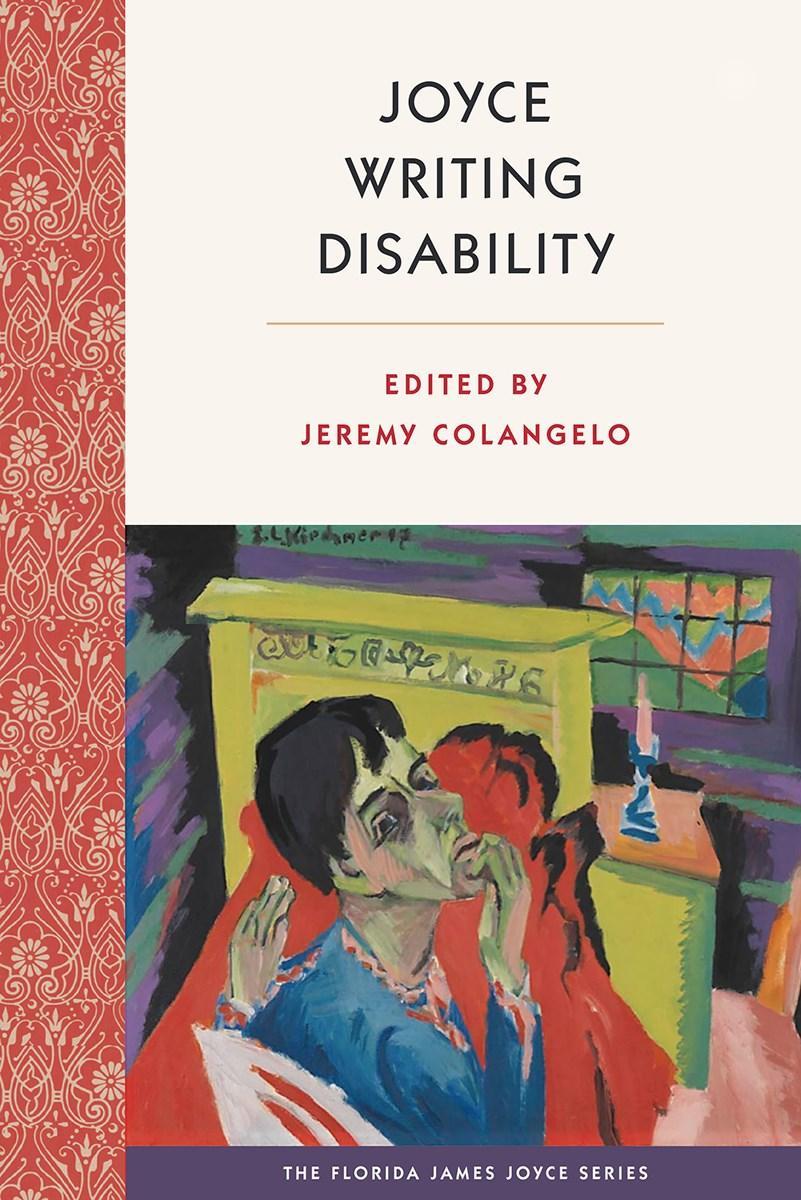
University of Florida Press 9780813069135 Pub Date: 2/22/2022 $127.50 Discount Code: 06 Hardcover 250 Pages Literary Criticism / European LIT004120 Series: The Florida James Joyce Series 9 in H | 6 in W | 0.7 in T | 1 lb Wt
Joyce Writing Disability
Jeremy Colangelo
Markup Note:
Rights Available: Translation, Audio, Film and Television Rights Unavailable: Cage Poem - World rights, English only
Contact
Milo Brooks rights@upress.ufl.edu
Summary
In this book, the first to explore the role of disability in the writings of James Joyce, contributors examine the varying ways in which Joyce’s texts represent disability and the environmental conditions of his time that stigmatized, isolated, and othered individuals with disabilities.
In this book, the first to explore the role of disability in the writings of James Joyce, contributors approach the subject both on a figurative level, as a symbol or metaphor in Joyce's work, and also as a physical reality for many of Joyce's characters. Contributors examine the varying ways in which Joyce's texts represent disability and the environmental conditions of his time that stigmatized, isolated, and othered individuals with disabilities. The collection demonstrates the centrality of the body and embodiment in Joyce's writings, from Dubliners and A Portrait of the Artist as a Young Man to Ulysses and Finnegans Wake. Essays address Joyce's engagement with paralysis, masculinity, childhood violence, trauma, disordered eating, blindness, nineteenth-century theories of degeneration, and the concept of "madness."Together, the essays offer examples of Joyce's interest in the complexities of human existence and in challenging assumptions about bodily and mental norms.
Contributor Bio
Jeremy Colangelo is a postdoctoral fellow at SUNY Buffalo and lecturer at the University of Western Ontario. He is the author of Diaphanous Bodies: Ability, Disability, and Modernist Irish Literature.






